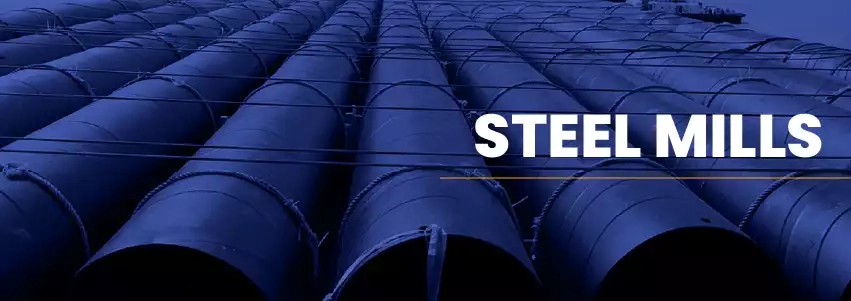List of Steel Mills Forwarders in OPCA
The steel industry is a crucial pillar of the global economy, and its logistics requirements are complicated, involving the shipping of heavy, oversized, and high-value products. As part of the Overseas Project Cargo Association (OPCA), our network connects project cargo freight forwarders who specialize in the logistics of steel products. OPCA members offer a wide range of freight services, ensuring the safe and timely delivery of steel items, including raw materials, coils, beams, slabs, and finished products.
Our network of global project cargo freight forwarders ensures seamless operations across all shipping modes — from sea freight and air cargo to rail and road transport. With the right expertise, the members manage the specific needs of steel mills, optimizing freight operations for both domestic and overseas shipments.
Join OPCA's Steel Mills Freight Network!
For international freight forwarders specializing in steel mills, joining OPCA's network means being part of a global group dedicated to the efficient and secure transport of steel products. Our members benefit from exclusive access to a vast network of logistics professionals, technology-driven solutions, and strategic support that can help streamline operations.
By joining OPCA, you gain the advantage of a well-established platform to connect with like-minded project freight providers. Our team understands the unique demands of the steel industry, from handling oversized loads to managing complex supply chains. You can expect tailored solutions that address challenges such as managing seasonal fluctuations, ensuring timely delivery despite potential geopolitical tensions, and adapting to changing customer (exporters and importers) needs in the steel trade.
Compare Steel Mills Freight Forwarders
When choosing a steel mills freight forwarder, it is essential to consider many factors that directly impact logistics performance. The members are recognized for their specialized knowledge in handling various types of steel products, including cold-rolled and hot-rolled steel, flat steel products, long steel products, and specialty steel.
Key criteria to compare include:
Expertise in Handling Steel Products: Steel products come in diverse shapes and sizes, and each requires different handling. From heavy machinery to high-value steel structures, OPCA members ensure specialized management of each item.
Efficiency in Inventory Management: Effective management of steel inventories is crucial. Our members use advanced technologies like Warehouse Management Systems (WMS) to ensure efficient stock management, reduce holding costs, and guarantee timely delivery.
Logistical Flexibility: With multimodal transportation options and strategic terminals near key transportation hubs, OPCA members can provide flexible solutions to meet the specific demands of steel mills.
Safety and Compliance: Ensuring safe and secure transportation of steel products is a priority. Our members prioritize safety, with dedicated teams ensuring that steel products are delivered without damage, following the necessary international trade regulations.
The Role of Steel Mills in Global Trade
Steel mills play an important role in the global economy, producing essential materials used in a wide array of industries, including construction, automotive, machinery manufacturing, and packaging. As demand for steel grows due to rising construction and manufacturing activities, the need for effective steel mill logistics also becomes critical. The versatility and durability of steel make it an indispensable material in numerous sectors such as defence industry.
However, the steel trade is impacted by fluctuations in international trade agreements, commodity prices, and geopolitical issues. The increased focus on sustainability in the industry further complicates supply chain management. Steel mills are increasingly adopting recycling practices and reducing their environmental impact while also managing the complexities of a global supply chain.
In this environment, the role of project cargo freight forwarders, especially those in the OPCA network, becomes even more significant. The need for efficient and optimized delivery, from production to distribution, requires forward-thinking logistics strategies. Our members provide tailored solutions, ensuring that steel products are delivered safely, cost-effectively, and on time, despite the challenges posed by a dynamic global market.
Frequently Asked Questions (FAQs) About Steel Mills Shipments
What services do OPCA members offer for steel mills?
OPCA members specialize in efficient steel product transportation, advanced inventory management, and optimized supply chain solutions. The members also offer specialized project cargo management for steel-related projects, ensuring the safe delivery of heavy machinery and oversized components.
How does OPCA support steel mills with logistics challenges?
OPCA members help steel mills overcome logistics challenges through real-time data, strategic insights, and an extensive network of logistics partners. Our members are qualified professionals in optimizing transportation, managing storage, and ensuring compliance with global trade regulations.
What types of steel products can OPCA handle?
The members companies can handle a wide range of steel products, including flat-rolled steel, long steel products, cold and hot-rolled steel, and specialty steel items. They ensure these products are safely transported, from raw materials to finished goods, across all shipping modes.
How can I join the OPCA network as a steel mills freight forwarder?
There are some membership criteria and requirements to join the OPCA. Simply contact us to learn about the membership process. Once onboard, you will gain access to our global network, specialized knowledge, and tailored solutions to enhance your steel mills logistics operations.
Why is steel logistics so complicated?
Steel logistics is complex due to the size, weight, and diverse handling requirements of steel products. Additionally, fluctuations in global demand, geopolitical issues, and the need for sustainability in operations add layers of complexity to the supply chain. OPCA members provide exclusive solutions to manage these challenges properly.
_logo.webp)



